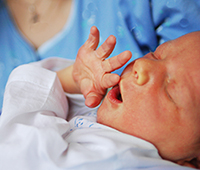Pregnancy and Substance Use Disorder

If you are pregnant or thinking about being pregnant, keeping drug-free is important to the health of your developing baby. Alcohol and drug use by pregnant women is called Maternal Substance Use Disorder (SUD). Maternal SUD is serious and can harm not only the development of the fetus, but also later growth and development of the child. For example, heroin, methadone, and heavy alcohol use during pregnancy are linked to lower birth weights and central nervous system (CNS) problems in babies. Babies whose mothers use cocaine during pregnancy are often born premature (early), with smaller head size and lower weight than babies born to mothers who don?t use.
Neonatal Abstinence Syndrome (NAS)
Babies born to women who used substances during their pregnancies may even show signs of addiction and withdrawal (problems from stopping use of the drug) shortly after they are born. This is called Neonatal (newborn) withdrawal or neonatal abstinence (nonuse) syndrome (NAS). NAS is a withdrawal syndrome in babies caused when the mother stops misusing prescription or illegal drugs. NAS can have many bad effects on the baby, including premature birth, and needing to stay in the hospital longer. Signs and symptoms of NAS newborns are:
- loud, high-pitched crying
- sweating
- digestive problems
- tremors and/or jitters
- trouble staying quiet while alert
- limited reaction to senses like touch, vision, or sound
NAS can cause permanent damage on mental health and development and behavior. Many factors, such as the amount and number of all drugs used, extent of prenatal care, maternal nutrition, and other health conditions can have an effect on maternal, fetal, and child outcomes.
When a woman wants to become or is pregnant, stopping substance use early is the best way to help her baby be healthy.


